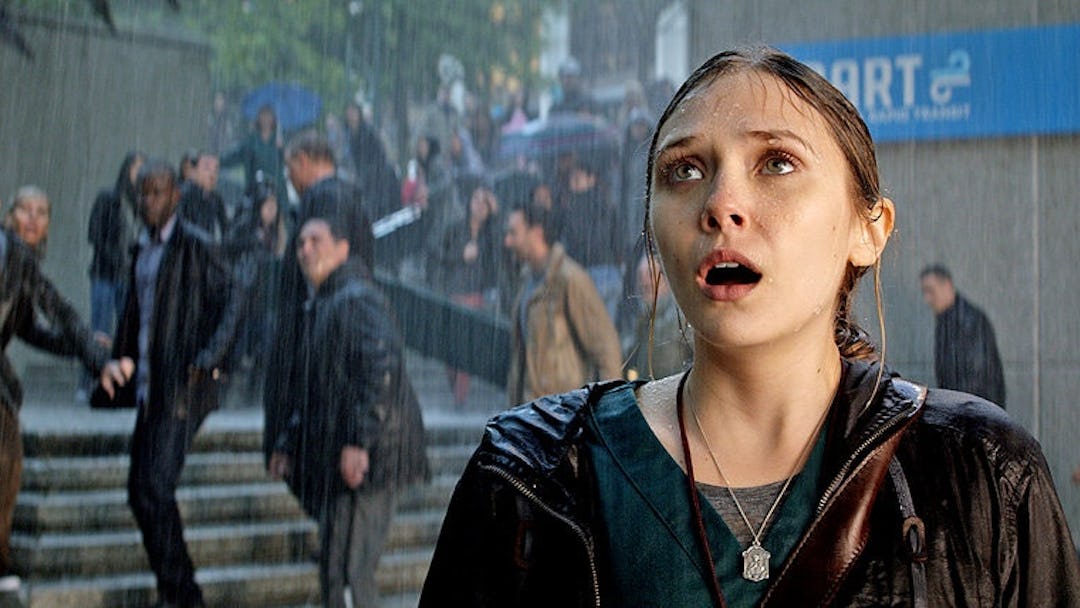Hollywood tentpole filmmaking is a cynical business. This summer alone, we’ve got multiple sequels, a three-quel, a four-quel, two five-quels, two reboots, and two sequels to reboots. One of those reboots is Godzilla, Gareth Edwards’ new take on the classic Japanese monster, one that’s already been through multiple incarnations, from the original Toho Studios series to attempted re-launches in 1984, 1998, 1999, and 2004. In other words, Godzilla is basically Product, reanimated and trotted out again every few years to see if this one takes, and it’s understandable for the viewer to approach it with some wariness. But shockingly enough, considering its worn-out pedigree, Godzilla doesn’t feel cynical; there’s a sense of joy to the picture, of honest-to-God fun, which separates it from many of its summer movie brethren.
Which is not to imply that it’s a great movie — it’s chock full of problems, and they’re almost entirely located on the script level. The jumbled storyline (which gets a lot of screen time) concerns the meltdown of a Japanese nuclear plant, a peculiar biological discovery in the Philippines, a scientist turned conspiracy theorist (Bryan Cranston), his various abandonment issues regarding his son (Aaron Taylor-Johnson), said military son’s attempts to re-establish his family life after a long tour, and so on and so on. Lest you think Max Bornstein’s screenplay isn’t derivative enough, it even includes an appearance, mid-catastrophe, by a brave little dog.
But there’s also a sense, in the midst of all the turgid melodrama and pseudo-scientific mumbo jumbo, that they’re not taking this stuff all that seriously — that the soapy concerns of the non-giant-lizard characters are boxes to be checked, self-aware requirements of the series (and don’t forget, even the initial 1954 outing had that dreary love triangle to drag it down). Alexandre Desplat’s witty score certainly seems to be in on the joke, allowing these humans their minor concerns, fully aware that we’re biding our time until the big guy appears.
And kudos to Edwards for deciding to fill those roles with actors that read more like the cast of a Weinstein Company Oscar hopeful than a big-budget summer blockbuster: Bryan Cranston, Elizabeth Olsen, Juliette Binoche, Sally Hawkins, Richard T. Jones, and David Strathairn all appear, turning in performances that range from capable to nearly-inspired. (The cast’s international flavor probably doesn’t hurt worldwide box office either.) On the other hand, poor Ken Watanabe’s character is mostly reduced to a series of confused reaction shots, and the transformation of Kick-Ass’ Taylor-Johnson into some kind of generic vanilla muscle slab is not an improvement.
But they’re not what we’re here for. The title character’s big arrival, nearly an hour in, is a real piece of pop movie magic: beautifully prepared and brilliantly executed, it brings the house down. The iconography of the character — his look, his size, his screech, his fighting style — has been lovingly reproduced and given some digital zip, and as Godzilla stomps and shrieks his way through the San Francisco Bay, it’s pretty much impossible not to give yourself over to this thing.
Director Edwards, who got the gig after his impressive (and low-budget) Monsters, is clearly relishing the opportunity to play with all his new toys, while pausing to occasionally shake things up; I, for one, appreciate his remarkable willingness (gleeful pleasure, it almost seems) to kill off his marquee players. But mostly, the movie pulses with his love for the genre. He’s not just reworking Godzilla here; there are echoes of the Alien movies, the less-beloved Gamera series, and pretty much every big Spielberg movie (there’s an abundance of images of people looking past the camera at the Rapidly Approaching Something). Edwards throws all of these blockbuster elements into the blender, and hits puree with a cackle.
But most importantly, he and screenwriter Borenstein figure out how to honor the original series and situate their story within it. The creation of a Fukushima-inspired backstory aligns nicely with the original film’s nuclear concerns, and the filmmakers wisely learned what the makers of the flaccid 1998 version didn’t: that the audience wants to root for Godzilla, and that the key to his longevity in the original films was the battle-based plots which placed the big lug in opposition with a genuinely destructive force. (Or, as the Watanabe character growls, “Let them fight.”) Here, he’s facing two giant killer MUTOs (Massive Unidentified Terrestrial Organism) — giant versions of the title creature in Alien, basically, against whom Godzilla takes on a protective stance. So that’s where the action set pieces of the second half come in, and they are exciting, convincing, and smoothly executed. You can’t always say that about your big summer movies, even the good ones. And if Godzilla is hampered by numb-skulled dialogue and soapy sidebars, well, that’s as much par for the course as big lizard monsters knocking over buildings.
Godzilla is out tomorrow in wide release.
